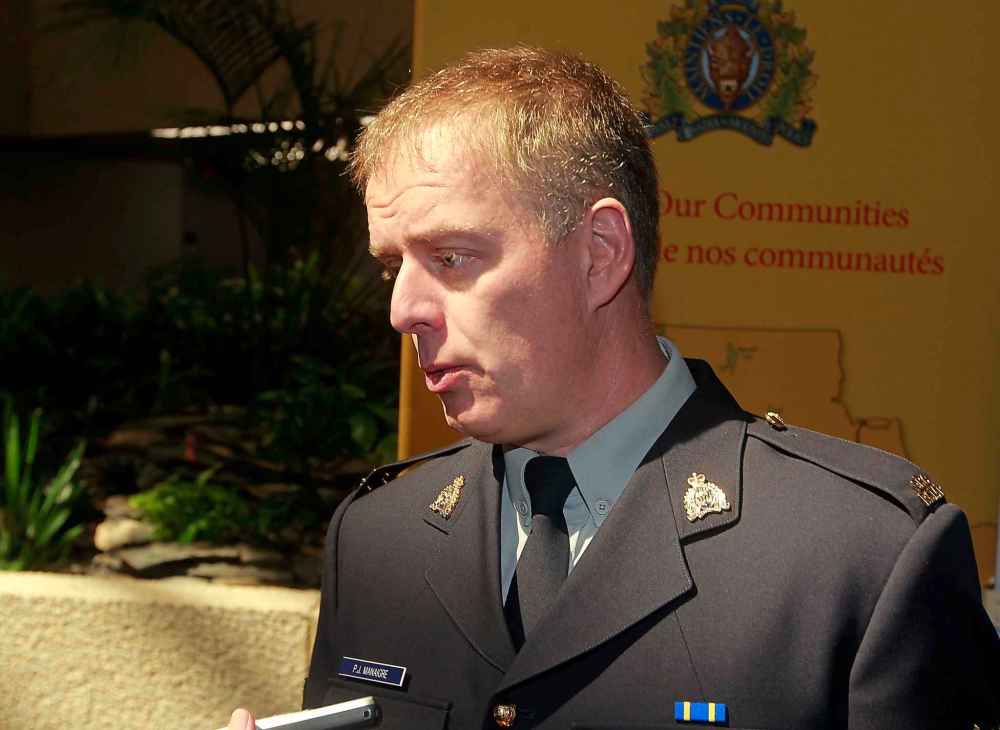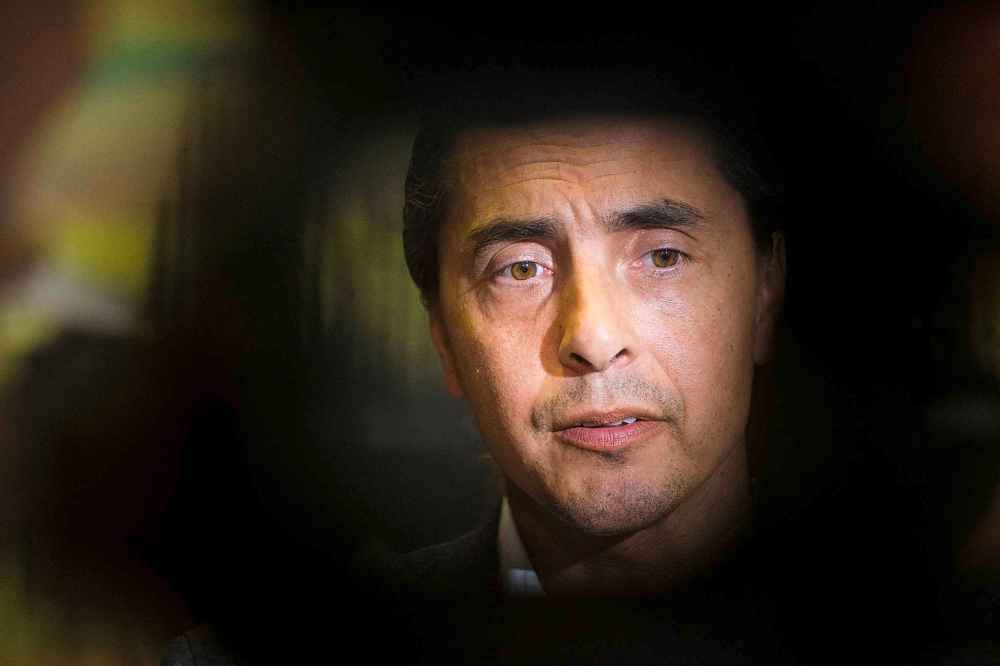RCMP may call in watchdog to investigate police role in sexual assault allegations in Northern Manitoba
Read this article for free:
or
Already have an account? Log in here »
To continue reading, please subscribe:
Monthly Digital Subscription
$0 for the first 4 weeks*
- Enjoy unlimited reading on winnipegfreepress.com
- Read the E-Edition, our digital replica newspaper
- Access News Break, our award-winning app
- Play interactive puzzles
*No charge for 4 weeks then price increases to the regular rate of $19.00 plus GST every four weeks. Offer available to new and qualified returning subscribers only. Cancel any time.
Monthly Digital Subscription
$4.75/week*
- Enjoy unlimited reading on winnipegfreepress.com
- Read the E-Edition, our digital replica newspaper
- Access News Break, our award-winning app
- Play interactive puzzles
*Billed as $19 plus GST every four weeks. Cancel any time.
To continue reading, please subscribe:
Add Free Press access to your Brandon Sun subscription for only an additional
$1 for the first 4 weeks*
*Your next subscription payment will increase by $1.00 and you will be charged $16.99 plus GST for four weeks. After four weeks, your payment will increase to $23.99 plus GST every four weeks.
Read unlimited articles for free today:
or
Already have an account? Log in here »
Hey there, time traveller!
This article was published 22/08/2018 (2669 days ago), so information in it may no longer be current.
OTTAWA — The RCMP is considering calling in the Independent Investigation Unit to probe fresh allegations Mounties ignored abuse and even perpetuated “gangbangs” against Indigenous people during Manitoba Hydro’s dam-construction projects dating back to the 1960s.
The Mounties told the Free Press they’re in discussions with the IIU, one day after the Pallister government asked the RCMP to examine incidents that locals said their own officers took part in.
The provincial government released a bombshell report Tuesday by the Clean Environment Commission documenting discrimination and sexual abuse by Manitoba Hydro staff in northern communities. Sustainable Development Minister Squires said Tueday she was “referring the report to the RCMP for investigation.”
Yet that report alleged RCMP complicity in “brutalizing men, permitting the exploitation of women, and failing to take local complaints seriously, although there were instances of these complaints being addressed.”
Feds not intervening in RCMP allegations
The federal government does not appear to be intervening in the CEC report’s findings involving the RCMP.
A spokesman for federal Public Safety Minister Ralph Goodale, who oversees the RCMP, noted that Mounties contracted to provincial postings fall under provincial jurisdiction.
The federal government does not appear to be intervening in the CEC report’s findings involving the RCMP.
A spokesman for federal Public Safety Minister Ralph Goodale, who oversees the RCMP, noted that Mounties contracted to provincial postings fall under provincial jurisdiction.
“The Manitoba RCMP was made aware of the report yesterday and it is currently being reviewed. It is premature to speculate about next steps at this point,” wrote Scott Bardsley.
Since 1988, the Civilian Review and Complaints Commission for the RCMP has probed complaints of police not adequately investigating incidents. It’s unclear whether the commission would be able to probe events that occurred before its founding.
A change to the CRCC mandate in 2014, has meant the agency only has to investigate incidents that occurred in the previous 12 months. Whether its investigators probe anything older than a year is at the discretion of its chief, though it’s possible the federal Cabinet would advocate a review.
—Dylan Robertson
In the hearings, Franklin Arthurson of Fox Lake Cree Nation testified on Jan. 19, 2018, the RCMP had “organized gangbangs” in nearby Gillam:
“They would pick up Fox Lake women, take them to jail, and bring all of the Hydro guys there to do what they wanted with these young women,” he told the commission. “I seen women raped,” the transcript reads.
“They told the stories about being picked up by the RCMP, taken to jail for no reason, to be sexually abused while being incarcerated in jail overnight.”
On Wednesday, Sgt. Paul Manaigre said the RCMP had only begun reviewing that testimony and the CEC report. “The allegations within the transcript are troubling and require investigation,” he wrote.
Manaigre noted the force is in touch with the IIU, a civilian-run oversight body started in 2015 to probe Manitoba incidents of serious harm or death involving police.

Howard Morton directed Ontario’s equivalent, the Special Investigations Unit from 1992 to 1995. He said the Manitoba RCMP likely have seven to 10 days to call in an external investigator before the public starts agitating for such a move.
“What’s happened in Manitoba’s got to be investigated,” he said. “I cannot imagine [the RCMP] letting that go; the criticisms they would get for not looking at that would be enormous.”
Morton said that it’s possible Manitoba RCMP officers could investigate failures of officers to adequately look into alleged crimes, or refer those incidents to force’s review body.
But he said incidents of Mounties themselves perpetuating crimes themselves need independent review, especially amid a national reckoning of police mistreatment of Indigenous people: “First Nations women are found murdered in the middle of a field somewhere and there’s bloody little investigation at all; they say ‘Oh well, she’s just another dead Indian, drunken Indian or a prostitute.'”
The Assembly of Manitoba Chiefs has referred the CEC report to the National Inquiry into Missing and Murdered Indigenous Women and Girls. AMC Grand Chief Arlen Dumas also called for an independent investigation.
“There are some pretty significant things in that report that show a lot of fault within the RCMP themselves,” Dumas told reporters in Winnipeg on Wednesday.

“Perhaps the RCMP will take it as an opportunity of perhaps a self-cleansing to do a proper due diligence, as they should have in the past, and build toward a remedy on how we move forward.”
Bob Kells, a retired RCMP superintendent in Calgary, said police agencies started calling in external investigators amid growing public demand for accountability in the decade following the 1984 Charter of Rights and Freedoms.
“The public didn’t have the confidence — even though a police officer might have done a superb job investigating — they didn’t have the confidence that it was done without bias,” he recalled.
Kells said the Manitoba RCMP can probably start searching for whatever records still exist, as even external investigators will need them, and they’re likely buried in storage somewhere.
He also said that given the timeline of allegations, it’s likely most of the Mounties involved have died. He said any investigation would likely have to focus on severe criminal acts, because police were bound by looser codes of conduct in the past, in terms of what behaviours they were tasked with investigating, and how they treated local citizens.
dylan.robertson@freepress.mb.ca












